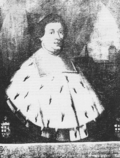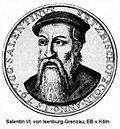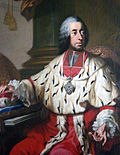| Image | Name | From | To | Notes |
|---|
| Konrad von Hochstaden | 1238 | 1261 | |
| Engelbert II von Falkenburg | 1261 | 1274 | |
| Siegfried II of Westerburg | 1274 | 1297 | |
| Wikbold I von Holte | 1297 | 1304 | |
| Heinrich II von Virneburg | 1304 | 1332 | |
| Walram von Jülich | 1332 | 1349 | |
| Wilhelm von Gennep | 1349 | 1362 | First Elector of Cologne under the Golden Bull of 1356 |
| Adolf II von der Marck | 1363 | 1363 | |
| Engelbert III von der Marck | 1364 | 1369 | |
| Kuno II von Falkenstein (coadjutor) | 1370 | 1371 | |
| Friedrich III. von Saarwerden | 1372 | 1414 | |
| Dietrich II von Moers | 1414 | 1463 | |
 | Ruprecht of the Palatinate | 1463 | 1480 | |
 | Hermann IV of Hesse | 1480 | 1508 | |
 | Philip II of Daun-Oberstein | 1508 | 1515 | |
 | Hermann V von Wied | 1515 | 1546 | Sought to reform religious practice in the Electorate; converted to Protestantism; deposed and excommunicated. |
| Adolf III of Schauenburg | 1546 | 1556 | |
| Anton of Schauenburg | 1556 | 1558 | |
| Gebhard I von Mansfeld-Vorderort | 1558 | 1562 | A founding member of the Schmalkaldic League |
| Friedrich IV of Wied | 1562 | 1567 | |
 | Salentin von Isenburg-Grenzau | 1567 | 1577 | Upon the deaths of his younger and older brothers, there were no more brothers to carry on the family name; he left Church administration in 1577, married, had two sons and conducted a successful military career. He died in 1610. |
 | Gebhard II Truchsess von Waldburg | 1577 | 1583 | Converted to Calvinism in 1582; married Agnes von Mansfeld-Eisleben (cousin once removed of the archbishop and Prince-Elector Gebhard I von Mansfeld-Vorderort); Competing archbishop elected; Cologne War decides the outcome. |
 | Ernest of Bavaria | 1583 | 1612 | Brother of William V, Duke of Bavaria; Papal Nunciature established permanently in Cologne. |
 | Ferdinand of Bavaria | 1612 | 1650 | Brother of Maximilian I, Elector of Bavaria, nephew of Ernest of Bavaria. Principle of Secundogeniture. |
 | Maximilian Henry of Bavaria | 1650 | 1688 | First cousin of Ferdinand Maria, Elector of Bavaria |
 | Joseph Clemens of Bavaria | 1688 | 1723 | Brother of Maximilian II Emanuel, Elector of Bavaria. Put under Imperial ban for siding with France in the War of the Spanish Succession. |
 | Clemens Augustus I of Bavaria | 1723 | 1761 | Brother of Charles, Elector of Bavaria and Emperor. Last Wittelsbach to hold the office. |
 | Maximilian Frederick of Königsegg-Rothenfels | 1761 | 1784 | |
 | Maximilian Franz of Austria | 1784 | 1801 | The electorate's left-bank territories were seized and annexed by France in 1795. Son of Empress Maria Theresa and second patron of Ludwig van Beethoven. |
 | Anton Viktor of Austria | 1801 | 1803 | The electorate's remaining territories were secularized and given to the Landgrave of Hesse-Darmstadt in 1803. |
















